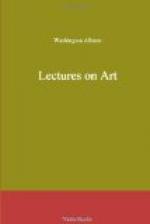stage, on the second day, as we were changing horses,
I had the good fortune to light on a face which gave
promise of all I wanted. It was so remarkable
that I could not take my eyes from it; the forehead
might have been called handsome but for a pair of enormous
eyebrows, that seemed to project from it like the
quarter-galleries of a ship, and beneath these were
a couple of small, restless, gray eyes, which, glancing
in every direction from under their shaggy brows, sparkled
like the intermittent light of fire-flies; in the nose
there was nothing remarkable, except that it was crested
by a huge wart with a small grove of black hairs;
but the mouth made ample amends, being altogether
indescribable, for it was so variable in its expression,
that I could not tell whether it had most of the sardonic,
the benevolent, or the sanguinary, appearing to exhibit
them all in succession with equal vividness.
My attention, however, was mainly fixed by the sanguinary;
it came across me like an east wind, and I felt a
cold sweat damping my linen; and when this was suddenly
succeeded by the benevolent, I was sure I had got at
the secret of his character,—no less than
that of a murderer haunted by remorse. Delighted
with this discovery, I made up my mind to follow the
owner of the face wherever he went, till I should
learn his history. I accordingly made an end
of my journey for the present, upon learning that
the stranger was to pass some time in the place where
we stopped. For three days I made minute inquiries;
but all I could gather was, that he had been a great
traveller, though of what country no one could tell
me. On the fourth day, finding him on the move,
I took passage in the same coach. Now, said I,
is my time of harvest. But I was mistaken; for,
in spite of all the lures which I threw out to draw
him into a communicative humor, I could get nothing
from him but monosyllables. So far from abating
my ardor, this reserve only the more whetted my curiosity.
At last we stopped at a pleasant village in New Jersey.
Here he seemed a little better known; the innkeeper
inquiring after his health, and the hostler asking
if the balls he had supplied him with fitted the barrels
of his pistols. The latter inquiry I thought
was accompanied by a significant glance, that indicated
a knowledge on the hostler’s part of more than
met the ear; I determined therefore to sound him.
After a few general remarks, that had nothing to do
with any thing, by way of introduction, I began by
hinting some random surmises as to the use to which
the stranger might have put the pistols he spoke of;
inquired whether he was in the habit of loading them
at night; whether he slept with them under his pillow;
if he was in the practice of burning a light while
he slept; and if he did not sometimes awake the family
by groans, or by walking with agitated steps in his
chamber. But it was all in vain, the man protesting
that he never knew any thing ill of him. Perhaps,
thought I, the hostler having overheard his midnight




